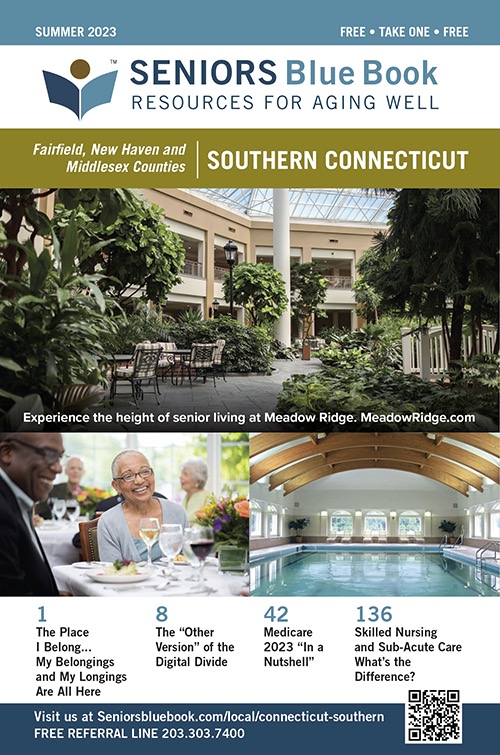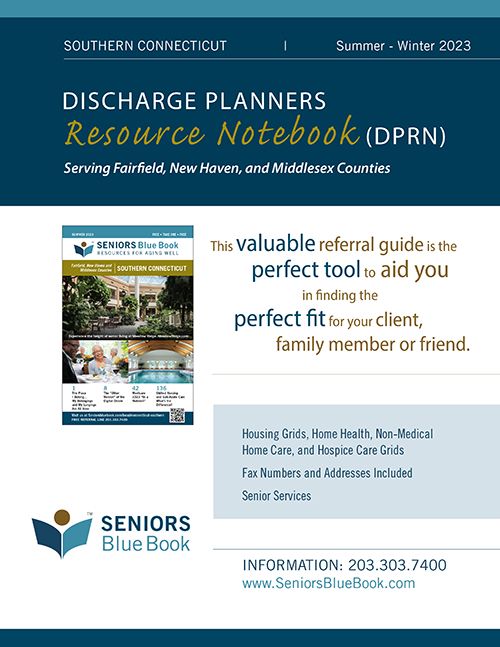Welcome to Seniors Blue Book's new home page for Southern Connecticut. Here you will find the latest information on senior care, housing, resources and local events for your community. This site compliments our local Seniors Blue Book and our edition for professionals, the Discharge Planners Resource Notebook. Feel free to email us and let us know how we can help you. We look forward to hearing from you soon! Carol Raitanen, Publisher

Browse through the most recent copy of your local SBB!
Click to view
Browse through the most recent copy of your local DPRN!
Click to view
.png)
.png)

Bridges by EPOCH at Norwalk is excited to introduce our new Executive Directror, Gina Cambre. Mix and mingle with fellow colleagues over cocktails and hors d'oeuvres, compliments of our chef, while getting to know Gina and other members of our team.Kindly RSVP to Dean Brown, dbrown@epochsl.com. BridgBreWednesday, May 15 | 4:30 6:30 p.m. Bridges by EPOCH at Norwalk is excited to introduce our new Executive Director, Gina Cambre. Mix and mingle with fellow colleagues over cocktails and hors doeuvres, compliments of our chef, while getting to know Gina and other members of our team.
Our speaker for the May meeting will be Healther Hitchcock, Community Educator, Bristol Behavioral Health
Join us for a morning of networking and collaboration on how we can better serve the senior citizens of the Greater Milford Area.
The Stratford Visiting Nurse Association (VNA) is the regions most innovative, non-profit, and independent homecare agency, serving the needs of patients and families throughout Fairfield and New Haven counties since 1919.At the Stratford VNA, we practice Technology with Touch. This means we combine Mobile Health Technology (MHT) with personal care. With MHT we offer high-tech support right at home. At the same time, we know that technologyno matter how advancedcannot take the place of experienced, caring health specialists whose only goal is to assist in the patients successful recovery.
Women-owned and operated law firm that focuses inthe areas of Elder Law, Estate Planning, Wills, Trusts, Probate,Medicaid/Title-19, and Real Estate Closings. Our friendly staff is ready towalk you through our appointment procedure and set up a time that works bestfor you and your family.
The coordination and oversight of ones well-being is of paramount importance to us. The challenge is that most of us dont admit when we need help and this is no different for our Elders or for anyone caring for a loved one. Sometimes we are unaware that we need support. Imagine you are not alone and you have the guidance and support you need to make appropriate choices as time marches on and other concerns arise. Care Management is the heartbeat of our Life Care Plans. We provide hourly services and short term contracts as well.We treat families as our own. We are the liaison for our clients advocating on their behalf, overseeing care coordination, and supporting their loved ones who are concerned and overwhelmed. We assist families in crisis from the emergency room visit or hospitalization, as they transition home with care or to short term rehab and we facilitate the best possible placement to a long term care facilities.We also offer assistance in accessing government benefits and other programs that may be available.
Women-owned and operated law firm that focuses inthe areas of Elder Law, Estate Planning, Wills, Trusts, Probate,Medicaid/Title-19, and Real Estate Closings. Our friendly staff is ready towalk you through our appointment procedure and set up a time that works bestfor you and your family.
Building the Case for Home CareThere are many misconceptions about home care. This article explores two of the most common questions: when is it indicated; and how is it paid for?When should you consider home care? There are two catalysts for home care: 1) medical need; 2) custodial need. Medical need typically follows a hospitalization or acute illness leaving you in need of highly skilled home care to help you improve your condition. Physicians must order home care services. The services are designed to improve your medical health to maximum improvement status. Often the intervention helps you regain your strength and stability after a period of illness. Thanks to a lawsuit brought by the Center for Medicare Advocacy, medical home care may now be paid by Medicare to prevent or slow the decline in condition. Custodial care may be indicated when a person is struggling to manage everyday tasks such as toileting, bathing and medication management or household tasks including homemaking, meal preparation or money management. It is more difficult to pinpoint that moment when custodial care is needed. Barriers may exist that prevent an individual from seeking assistance. Caregivers may feel guilt when they can no longer provide all necessary care. Seniors may feel that money saved over their lifetime should not be squandered away on their personal needs. It is sometimes difficult to accept ones frailty and the perceived loss of independence.How is home care paid? Medical care is often covered by Medicare and Medigap plans. Most care is limited in duration and ends once the patient has met an improvement threshold as determined by a physician. Keep in mind that medical care makes no provision to help you manage household activities as described above. Custodial care is paid for by the individual, family, Long Term Care (LTC) Insurance (if you have a policy) or Medicaid. Long Term Care Policies vary widely based on coverage and cost. A relatively small percentage of todays seniors have LTC insurance although more baby boomers are considering the option. Medicaid will cover custodial care only after you have impoverished yourself. Medicaid requires an individual to use their own assets before Medicaid begins. An individual can have no more than $1,600 in cash to qualify. Connecticut offers seniors with somewhat higher assets limited access to home care with certain restrictions. Visit www.SWCAA.org , CT Home Care tab for more information.
Read MoreShare your wishesAfter the often hectic buzz and planning of the holidays, we need a little time to regroup, reflect and set new resolutions come January. Maybe you've planned the holidays, the gifts, the decorations and who gets the guest bedroom. Now its time to think about you. Do your loved ones know how you'd want to be cared for if you couldn't advocate for yourself due to a serious illness or injury? Do they know if you would want extraordinary measures including being on a respirator to keep you alive? Are they aware whether or not you want comfort measures, including aggressive symptom management, to keep you comfortable until death? The decisionsabout your treatment and healthcare should be yours.Plan for the What if?While we wish and dream for many things, its understandable that even thinking about death may make us uncomfortable -- and yet a dignified and peaceful death is what we wish for. That sense of discomfort is nothing compared to thestress you and or your loved ones could endure if you haven't shared your final wishes before you are unable to actively make a decision on your own behalf. Additionally, its important to appoint someone who will act for you if any medical condition or circumstance should occur where you cannot speak for yourself. A Simple Form An Advance Directive is a legal document which expresses these preferences. It can contain a Living Will, the naming of a healthcare representative or both. Surprisingly, its pretty simple and can be done in a matter or minutes perhaps some of the most important minutes you can spend to help yourself and your family. You don't need a lawyer or a notary, just a good form and a pen to sign the document in the presence of two witnesses.We Can HelpRegional Hospice and Home Care can help. Visit us at regionalhospicect.org and download a copy of Advanced Directives, What you Should Know. Or, you canemail us at info@regionalhospicect.org and we can send it to you. Make your preferences known while you can consciously and thoughtfully planthem. Make sure to prepare for unexpected healthcare needs and make those final weeks or days less stressful for you and your loved ones by sharing thesewishes now.Make a resolution to get those wishes defined and shared before the next holiday
Read MoreExploring options for an assisted living facility can be daunting. Potential residents and families often become overwhelmed with all the options that are becoming available. One may wonder what the differences are between a retirement community, an assisted living community, enriched housing, a memory care community and a skilled nursing facility. What do they all mean?A Continuum of Care community is one that partners with levels of care on their campus as people age or become more compromised. It often begins, but not exclusively, with a retirement community. Within the community will be an Assisted Living component and a skilled nursing component. As the resident needs more help, they are moving within the community with the support of a comprehensive healthcare team that knows them well. This has become the trend in long term health care.The advantage to living in such a community is the promise of caring for your loved one through their elder years. The care team is always available to provide help and support not only to the family and the resident, but to one another, so as to offer the best possible person centered care. Another advantage is that the residents care community remains the same. This is convenient for them as well as their family members.Many assisted living facilities that are not a part of a continuum or campus of care refer to particular skilled nursing facilities. Be sure to ask what their policies are in terms of criteria for discharge and support during the process. Do not be afraid to ask these questions as they pertain to the care and well being of your loved one. Most facilities arevery helpful and have staff that specifically help with transitioning.A Campus of Care or a Continuum of Care Community is the most convenient and often the best option when looking for a residence for your loved one. As people are living longer and healthier into their elder years, this safety net may be just what most offers the security families need.This article was submitted by Maria Scaros-Mercado, Executive Director at The Greens at Greenwich, 203-531-5500 and Ship Hajdari, Community Outreach Nurse Liaison at Greenwich Woods Rehabilitation & Health Center, 203-531-1335.
Read MoreWhen older adults receive a diagnosis for a chronic illness like diabetes, heart disease, or emphysema, their lives change at least a little. Chronic illnesses can affect seniors mobility, fall risk, energy, and ability to live independent lives. Maintaining relationships with friends and family may become challenging. Financial concerns can complicate life and bring added stress. Coping with these changes can affect how well we feel in general, and can impact our quality of life.An acute illness is one that lasts for a short time and may go away without any intervention, or with medications or surgery. Chronic illness recurs or persists for a long period of time and may last for a persons entire life. According to the CDC (Centers for Disease Control and Prevention), chronic diseases are among the most common, costly, and preventable of all health problems.How can older people maintain their wellbeing and quality of life while facing chronic illness? Exercise is one of the simplest ways to maintain mobility, balance and strength, reducing fall risk. Exercise can also help lessen or even reverse the symptoms of chronic illness such as fatigue. Senior exercise classes can help strength and flexibility and also maintain social contacts.Staying connected with family and friends is important especially if activity is limited or a family member becomes a caregiver. These changes can affect relationships, and need to be acknowledged and worked through. Caregiving assistance from outside of the family may become necessary.Financial worries can add to the stress of chronic illness. Its important to discuss your concerns with your health care provider, who can direct you toward community resources to help navigate insurance and financial issues.Chronic illness is a part of life for more than three-quarters of older adults. Staying active, exercising, asking for assistance when needed, and staying socially connected can all help reduce stress and enhance quality of life.WRITTEN BY:Theresa Santoro, MSN, RN, CHCAPresident & CEORidgefield Visiting Nurse Association - Ridgefield CT203-438-4555
Read More